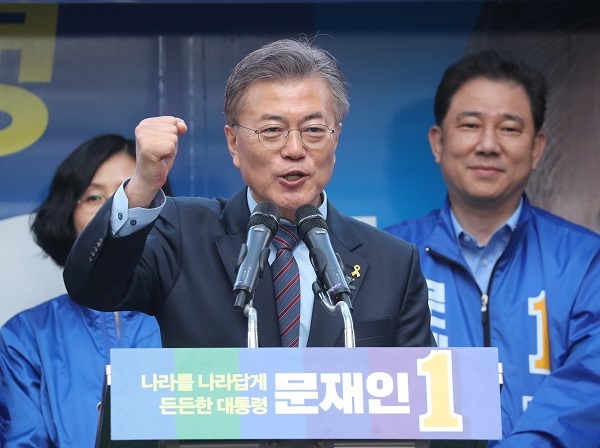[Election 2017] Debate brews over Moon’s refusal to call NK ‘main enemy’
By Shin Hyon-heePublished : April 20, 2017 - 16:13
Following the second round of televised debates, South Korea’s presidential race is heating up over the all-too-familiar issue: Is North Korea the “main enemy?”
During the late Wednesday session, Yoo Seong-min of the conservative splinter Bareun Party launched an offensive against front-runner Moon Jae-in of the Democratic Party of Korea, asking whether he considers the communist neighbor to be South Korea’s “main enemy.”
Moon sought to evade in answering, saying, “Such labeling is not the job for the president to do.” As Yoo countered that the phrase is enshrined in the official defense white paper, and he is running to become the commander-in-chief, Moon again replied, “It is not for the president to say.”
During the late Wednesday session, Yoo Seong-min of the conservative splinter Bareun Party launched an offensive against front-runner Moon Jae-in of the Democratic Party of Korea, asking whether he considers the communist neighbor to be South Korea’s “main enemy.”
Moon sought to evade in answering, saying, “Such labeling is not the job for the president to do.” As Yoo countered that the phrase is enshrined in the official defense white paper, and he is running to become the commander-in-chief, Moon again replied, “It is not for the president to say.”

“If elected, you, too, would have to resolve inter-Korean issues. A summit could be necessary, and there are things for the president to do other than that,” Moon said.
His replies instantly sparked debate via social media and in political circles, with supporters criticizing Yoo for stoking ideological strife and critics lashing out at what they see as a “shaky” security view and disrespect for some 600,000 young citizens serving in the military.
In fact, the 2016 defense white paper defines the North’s regime and military as “our enemy,” pointing to their operation of nuclear, missile, cyber and terror threats.
Although it has little practical value, the wording has often been a source of political controversy and thus undergone a number of revisions.
The term “main enemy” was first introduced in the 1995 white paper, but was removed in 2004 by the progressive Roh Moo-hyun administration. The expressions have since then varied slightly, involving references to “military threats,” until the conservative Lee Myung-bak government inserted the current phrase in 2010.
The latest controversy appears more rooted in Moon’s record of serving in liberal governments that traditionally favor engagement with the North, holding top secretarial roles for civil affairs and civil society under Roh.
Conservative voters worry that if Moon is elected, he may push for a sudden turnaround in the ongoing campaign to pile sanctions and pressure on Pyongyang, despite its evolving nuclear and missile threats.
Mindful of the concerns, other candidates stepped up their offensive against Moon on Thursday.
No. 2 in polls Ahn Cheol-soo of the center-left People’s Party lambasted him, explicitly calling North Korea the “main enemy.”
“Now we are in a situation where the South and North are facing off,” Ahn said in a separate debate hosted by the Korea Broadcasting Journalists Club in Seoul.
“Our command dilemma lies in the fact that while being the main enemy, North Korea is the partner for dialogue to achieve a peaceful unification at the same time.”
Yoo questioned Moon’s credentials to be the head of state, evoking controversy over the language in the defense paper during the Roh era.
“He apparently doesn’t think of North Korea as the main enemy,” Yoo said during a visit to Jeonju, North Jeolla Province.
“It’s a serious problem that a person who is campaigning to become the commander-in-chief cannot say it at a time when we confront (North Korean leader) Kim Jong-un and the North Korean military, which may commit provocations with a nuclear weapon, missile or other asymmetrical forces, or even start a war.”
The main conservative Liberty Party Korea emphasized that in a press interview ahead of the 2012 presidential election, Moon said it was “inappropriate” to refer to the North as the “main enemy” in the white paper, calling it “outrageous and inconceivable.”
“We spend about 40 trillion won ($35.1 billion) in defense every year and send youngsters to the military just because of North Korea, which is our main enemy,” party spokesperson Rep. Choung Tae-ok said at a news briefing.
By Shin Hyon-hee (heeshin@heraldcorp.com)






![[From the Scene] Monks, Buddhists hail return of remains of Buddhas](http://res.heraldm.com/phpwas/restmb_idxmake.php?idx=644&simg=/content/image/2024/04/19/20240419050617_0.jpg&u=20240419175937)





![[Graphic News] French bulldog most popular breed in US, Maltese most popular in Korea](http://res.heraldm.com/phpwas/restmb_idxmake.php?idx=644&simg=/content/image/2024/04/18/20240418050864_0.gif&u=)


![[From the Scene] Monks, Buddhists hail return of remains of Buddhas](http://res.heraldm.com/phpwas/restmb_idxmake.php?idx=652&simg=/content/image/2024/04/19/20240419050617_0.jpg&u=20240419175937)

![[KH Explains] Hyundai's full hybrid edge to pay off amid slow transition to pure EVs](http://res.heraldm.com/phpwas/restmb_idxmake.php?idx=652&simg=/content/image/2024/04/18/20240418050645_0.jpg&u=20240419100350)

![[Today’s K-pop] Illit drops debut single remix](http://res.heraldm.com/phpwas/restmb_idxmake.php?idx=642&simg=/content/image/2024/04/19/20240419050612_0.jpg&u=)